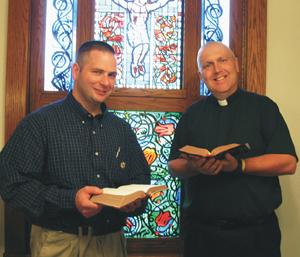
By Barb Arland-Fye
Mark Comer of St. Joseph Parish in DeWitt feels called to be of service to the church, not just in his parish, but in the wider diocese. A husband, father, businessman and active parishioner, he also is one of 16 men beginning the second year of an intensive, five-year deacon formation program in the Davenport Diocese.
Funding for deacon formation and other programs comes from the Annual Diocesan Appeal (ADA), which kicks off this weekend, Sept. 26-27, in parishes throughout the Davenport Diocese. The campaign goal is $2.9 million.
“My first year of the deacon program was awesome. The teachers were fantastic,” Comer says in a promotional brochure for the ADA.
High school junior Sarah Arensdorf of St. Mary Parish in Grinnell has also benefited from ADA funds. She’s participated in the annual Diocesan High School Youth Rally, teen overnights at her parish and leadership skill building on the Diocesan Youth Ministry Committee (DYMC).
While serving on DYMC, she was called to be a leader for the Diocesan Junior High Youth Rally. “I learned the tools of planning and the importance of detail when dealing with large groups of people. I made lots of new friends,” she says in the ADA brochure.
Another beneficiary of ADA funds is the Ministry Formation Program (MFP), which this past weekend awarded 40 certificates to adults throughout the diocese who have completed one or more levels of MFP. New classes are underway this fall for the multifaceted program, which educates and trains Catholics for ministry in the church. “Without MFP, some parishes wouldn’t have access to the instructors and other resources needed,” said IlaMae Hanisch, Ministry Formation coordinator.
These are a few examples of how the diocese connects with parishes. Helping people make the connection is a goal of Diocesan Development Director Sister Laura Goedken, OP.
In her travels to various parishes someone asked, “What difference does it make if parishioners give to the appeal or the parish pays the Annual Diocesan Appeal? The money still comes from the people.”
Sr. Goedken responded: “Yes. The money still comes from the people. By promoting the appeal in each parish, we want to connect parishioners with the diocese and with the larger universal church. The diocese can be an entity ‘out there’ that parishioners do not feel connected to and it does not affect them. Our more immediate connection to this universal church is our diocese. A diocese is a geographic area consisting of many parishes and under the leadership of the local bishop and responsible to the Holy Father.”
Bishop Martin Amos leads the Davenport Diocese, comprised of 80 parishes in southeastern Iowa. Assisting the bishop are directors and staffs who make it possible for the diocese to oversee Catholic schools, religious education programs, vocation promotion, deacons administering in parishes, social justice programs, marriage annulments, the sacrament of confirmation administered by the bishop, the ordination of new priests and so much more, Sr. Goedken said.
“As parishioners make their pledge to the Annual Diocesan Appeal, they are making the ministry of the diocese possible.”
This year’s $2.9 million goal is about $200,000 higher than last year’s goal and would cover 76 percent of diocesan operating expenses. Fees, grants and gifts would cover the remaining costs.
“This past year as the economy and unemployment have been major issues for people in our communities, concerns were raised about the church continuing to receive financial support. As we review the financial reports of our parishes we are happy to note that Catholics continue to give even in times of uncertainty,” said Diocesan Chief Financial Officer Char Maaske.
“In worrisome times, people turn to their church. And parishioners understand that without their help the church would have difficulty providing the continuing education expenses for our seminarians and deacon candidates, funding the chaplain program at University Hospitals and all the other services the diocese provides.”








